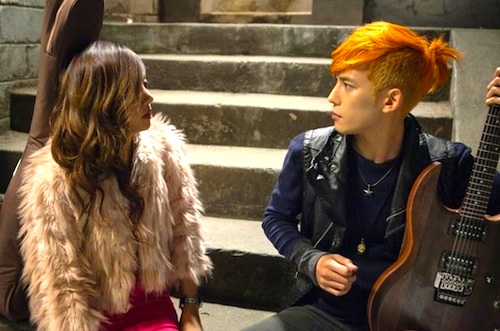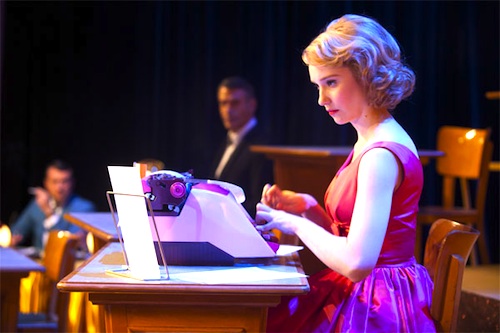Harry Dean Stanton: Partly Fiction Official Trailer from Adopt Films on Vimeo.
By Joe Bendel. He has some of the coolest credits ever, including Alien, Escape from New York, Red Dawn, Repo Man, and Wild at Heart. However, appearing as himself is a role he is not so comfortable with. As a result, Sophie Huber’s documentary treatment, Harry Dean Stanton: Partly Fiction is a rather impressionistic portrait that opens this Wednesday in New York.
Stanton is not the sort of fellow to sit down in front of a camera and commence name-dropping, but Huber, his friend and colleague, knew that coming in. Foregoing the conventional approach, she scored at least one coup. Up until now, Stanton declined offers to record his traditional vocals and harmonica playing, but she was able to capture many of his intimate performances. Frankly, that alone should constitute a respectable cinematic legacy for Huber.
 Indeed, Stanton’s voice is truly mesmerizing on old time favorites like “Blue Bayou,” “Blue Moon,” “Just a Closer Walk With Thee,” and the positively eerie closing rendition of “Danny Boy.” Stanton’s clear affinity for songs of loneliness and loss marries up perfectly with Huber’s portrait of a haunted backwoods Zen master.
Indeed, Stanton’s voice is truly mesmerizing on old time favorites like “Blue Bayou,” “Blue Moon,” “Just a Closer Walk With Thee,” and the positively eerie closing rendition of “Danny Boy.” Stanton’s clear affinity for songs of loneliness and loss marries up perfectly with Huber’s portrait of a haunted backwoods Zen master.
Unfortunately, the scenes without music lack the same quiet power. At times, Huber merely tries of soak up the ambiance of Stanton’s life, which gets a bit snoozy. The lack of any standard biographical treatment also occasionally leads to frustration, as when Stanton off-handedly comments on the unforgettable wildness of his years living with Jack Nicholson and hanging with Marlon Brando. Right, we can only imagine.
Huber incorporates some commentary from Stanton’s famous friends, perhaps most notably David Lynch, whom we see visiting with his chum. She also includes some film clips, relying heavily on Wim Wenders’ Paris, Texas, openly inviting audiences to conflate Stanton with his pseudo breakout role.
There are few outright scoops in Fiction, aside from Stanton’s disclosure (now widely remarked upon) that he once dated Rebecca De Mornay, before she made Risky Business and got involved with Hollywood’s favorite Scientologist. Who knew? One gets a sense Stanton guards a treasure trove of such revelations, but Huber never tries to dig them out. Still, the film has a stylishly evocative look, thanks to cinematographer Seamus MacGarvey’s striking black and white sequences.
Huber might leave many of Stanton’s fans scratching their heads, but at least they will know their man can sing. Periodically beautiful, Harry Dean Stanton: Partly Fiction is for diehard fans of Stanton and those who appreciate Americana folk songs when it inexplicably opens this Wednesday (9/11, probably the last date anyone would want to go to the movies) in New York at the Village East.
LFM GRADE: B-
Posted on September 10th, 2013 at 12:34pm.




